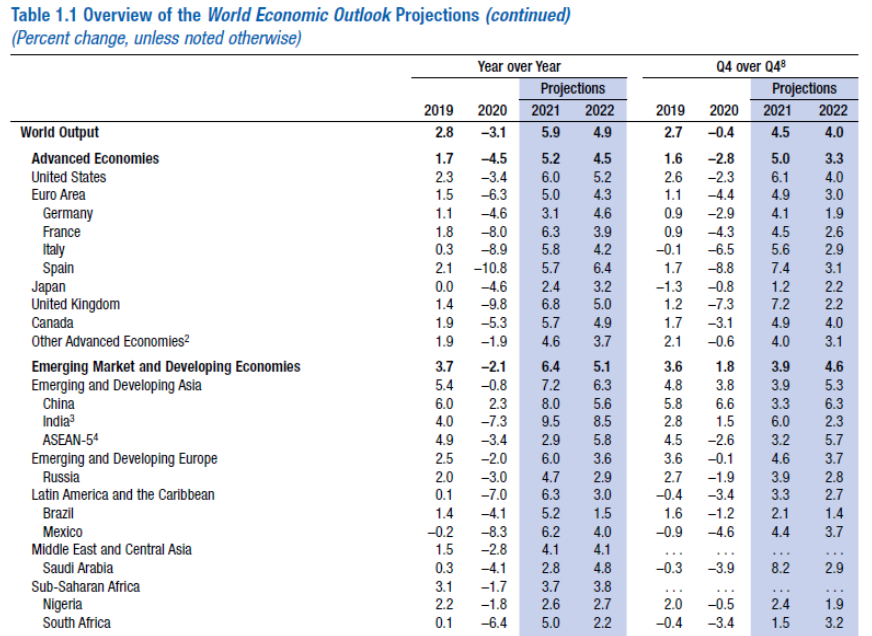The IMF’s October 2021 World Economic Outlook forecasts are out.
Two observations:
- There are substantial downgrades since July’s forecast, particularly for the US and ASEAN-5.
- There’s lots of variation – the recovery is uneven, geographically. Spain and UK at the top, 7.4% and 7.2% q4/q4, respectively. South Africa and Brazil at 1.5% and 2.1% respectively.
Source: WEO (October 2021), Chapter 1.
Source: WEO (October 2021), Chapter 1.
The blog on this release is here.


https://www.imf.org/en/Publications/WEO/weo-database/2021/October/weo-report?c=924,134,534,158,111,&s=NGDP_RPCH,&sy=2007&ey=2021&ssm=0&scsm=1&scc=0&ssd=1&ssc=0&sic=0&sort=country&ds=.&br=1
October 15, 2021
Gross Domestic Product for China, Germany, India, Japan and United States at constant prices, 2007-2021
2019
China ( 6.0) *
Germany ( 1.1)
India ( 4.0)
Japan ( 0.0)
United States ( 2.3)
2020
China ( 2.3) *
Germany ( – 4.6)
India ( – 7.3)
Japan ( – 4.6)
United States ( – 3.4)
2021
China ( 8.0)
Germany ( 3.1)
India ( 9.5)
Japan ( 2.4)
United States ( 6.0)
* Percent change
https://www.nytimes.com/2021/10/12/business/economy/imf-world-economic-outlook.html
October 12, 2021
World’s Growth Cools and the Rich-Poor Divide Widens
The International Monetary Fund says the persistence of the coronavirus and global supply chain crisis weighs on economies.
By Patricia Cohen and Alan Rappeport
As the world economy struggles to find its footing, the resurgence of the coronavirus and supply chain chokeholds threaten to hold back the global recovery’s momentum, a closely watched report warned on Tuesday.
The overall growth rate will remain near 6 percent this year, a historically high level after a recession, but the expansion reflects a vast divergence in the fortunes of rich and poor countries, the International Monetary Fund said in its latest World Economic Outlook report.
Worldwide poverty, hunger and unmanageable debt are all on the upswing. Employment has fallen, especially for women, reversing many of the gains they made in recent years.
Uneven access to vaccines and health care is at the heart of the economic disparities. While booster shots are becoming available in some wealthier nations, a staggering 96 percent of people in low-income countries are still unvaccinated.
“Recent developments have made it abundantly clear that we are all in this together and the pandemic is not over anywhere until it is over everywhere,” Gita Gopinath, the I.M.F.’s chief economist, wrote in the report.
The outlook for the United States, Europe and other advanced economies has also darkened. Factories hobbled by pandemic-related restrictions and bottlenecks at key ports around the world have caused crippling supply shortages. A lack of workers in many industries is contributing to the clogs. The U.S. Labor Department reported Tuesday that a record 4.3 million workers quit their jobs in August — to take or seek new jobs, or to leave the work force….
I’m curious how we perceive (“we”= sharpies like Menzie, Furman, and Gopinath etc.) the high UK number in relation to Brexit?? That the damage is already done?? (both earnest questions on my part)
Moses,
I understand that I am not part of your in-crowd of sharpies, but I did check. Other sources agree that UK has had more rapid GDP growth than many neighbors recently. It is hard to figure out what is going down there because this substantial growth is coinciding with a lot of problems such as major shortages apparently much worse than in other nations, including empty grocery shelves and closed gas stations. But as an acknowledged dullard, I am unable to explain all this. Sorry.
@ Barkley Rosser
That’s a more than acceptable answer. You and I agree rarely, so it actually lends more credence to my observation on UK. Although I am biased on my thoughts on your answer, as it, at the very least, doesn’t contradict my original thoughts, that Brexit was not going to be as bad as many were claiming. I never argued Brexit would have negative effects, just not near as bad as some people thought. And since you are being somewhat gentlemanly in your reply, I will also concede I “cheat sheeted” many of my thoughts on Brexit from Krugman. That’s not saying I didn’t do some of my own internalized reasoning on it, but I was following along his thoughts pretty close.